Reflections
SXSW Film Conference and Festival '98
Fri., March 20, 1998
Dir: Mary Cybulski, John Tintori; Scr: Will Kern; Prod: Paul Dillon, Suzanne Dewalt, Jamie Gordon; DP: Hubert Taczanowski; Ed: John Tintori, Mary Cybulski; Cast: Paul Dillon, Gillian Anderson, John Cusack, Michael Ironside, Laurie Metcalf, Julianne Moore.
35mm, 93 min., 1997 (RP)
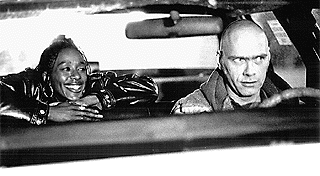
A special hell is reserved for bartenders and cabdrivers, folks who are forced to listen to the angst of the world, delivered by the souls who wander in and can't afford actual therapy. This kind of verbal vomit gets worse during the holidays, as emotions stretch like an overtuned guitar string. The cabdriver, soulfully played by Paul Dillon in Cybulski and Tintori's Chicago Cab, can personally attest to the inner workings of this level of hell as he cruises Chicago's streets, picking up the devilish, the stoned, the abused, and the powerful, all of whom view his backseat as a therapist's couch. UT film alumnus Will Kern's screenplay captures the essence of human flotsam, and the skillful cast, including names such as Gillian Anderson, John Cusack, Julianne Moore, and Laurie Metcalf, bring depth and dimension to each character, no matter how bizarre. Dillon himself does a remarkable job of tying this whole slice-of-humanity together with an amused, cynical, and full-fleshed performance that fills the screen with heartfelt substance and cautious amusement. The directors' skill with pace ensures that these dialogues never last too long and keeps Dillon's hell from becoming ours as well. -- Adrienne Martini
Next screening: 3/20, Union, 6:30pm
DOG YEARS
Dir/prod/scr/ed: Robert Loomis; Assoc Prod: Cecilia M. Flamme; Cast: R. Michael Caincross, Nietzsche, Ted Parks, Veronica Loomis.
16mm, 75 min., 1997 (WP)
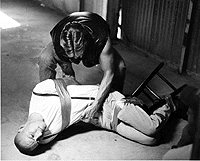 How far would you go to get your dog back if he disappeared? Ask Wally, the amiable skinhead whose Dalmatian, NeeChee, is abducted by bumbling gangsters after a chance run-in. He tries the conventional ways (like the dog pound) but soon visits his well-armed friend Lee for some firepower to take things up a notch or two. The crime boss (whose lieutenant sounds amazingly like a toned-down Ren Hoëk of Ren & Stimpy) orders two of his lamebrained thugs to rub out the dog, but the resourceful pooch makes good her escape and tries to find her Wally again. Desperate, the henchmen resort to adopting a black dog from the pound and dumping a sack of flour over him in the attempt to pass him off as NeeChee. Eventually, there's a price to be exacted at the gang's hideout, with the help of Wally's friend from the pound. The acting is a mite stiff in places, but it's more than made up for by the engagingly goofy story. There's plenty of gunplay, and plot convolutions aplenty; this story of an Oi-boy and his dog is no dog of a movie. -- Jerry Renshaw
How far would you go to get your dog back if he disappeared? Ask Wally, the amiable skinhead whose Dalmatian, NeeChee, is abducted by bumbling gangsters after a chance run-in. He tries the conventional ways (like the dog pound) but soon visits his well-armed friend Lee for some firepower to take things up a notch or two. The crime boss (whose lieutenant sounds amazingly like a toned-down Ren Hoëk of Ren & Stimpy) orders two of his lamebrained thugs to rub out the dog, but the resourceful pooch makes good her escape and tries to find her Wally again. Desperate, the henchmen resort to adopting a black dog from the pound and dumping a sack of flour over him in the attempt to pass him off as NeeChee. Eventually, there's a price to be exacted at the gang's hideout, with the help of Wally's friend from the pound. The acting is a mite stiff in places, but it's more than made up for by the engagingly goofy story. There's plenty of gunplay, and plot convolutions aplenty; this story of an Oi-boy and his dog is no dog of a movie. -- Jerry Renshaw
Next screening: 3/20, Dobie 3, 2pm
FRAT HOUSE
Dir/prod: Todd Phillips, Andrew Gurland; DP: Anthony Hardwick, Mott Hupfel; Ed: Salamo Levin, Juliette Weber.
16mm, 59 min., 1997 (RP)
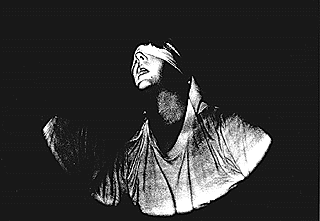
In filmmaking it's not just that truth is stranger than fiction, it's often the case that it's simply better at getting people to believe what should be believable. Todd Phillips and Andrew Gurland's documentary Frat House is that type of truth. If the sexist, foul-mouthed, narrow-minded head of the Beta Chi fraternity, the main focus of the first portion of the film, weren't an actual person, it would be dismissed as a construct. If the degrading, ritualistic hazing weren't captured with such hardcore reality, it would look a grotesque farce. But Phillips and Gurland not only pull off an unflinching and good, long look into the physical entrance exam for frat-dom, they do it with a perfect sense of style, as the documentary is often as funny as it is frightening. By getting inside the hazing itself (when their original storyline was abruptly derailed, the two filmmakers had to participate in the pledge to continue), they get the psychological undertones of both sides of the fence. And it only takes a few shots of "Hell Night" for the most incredible of symbiotic relationships to emerge: one in which the pledges need to endure the humiliation to become brothers, and the brothers need to haze in order to validate their previous and similar experience. Throughout the process, there is this sick battle between individual identity and the need to belong. If there is a failing in Frat House it is that the subject is inherently set up to be vilified, but the triumph is the response (in the form of a question): "Yeah, but don't they deserve it?"
In front of Frat House is the short "Fender Philosophers," in itself a humorously noteworthy piece in which director Lisa Leeman scratches the chrome surface to find populist activism in a most succinct and often clever form. -- Michael Bertin
Next screening: 3/20, Alamo, 4pm
GOREVILLE, U.S.A.
Dir: Seth Henrikson & David Sarno; Prod: James F. Roberts & James T. Volk; Exec Prod: W. Robert Gold; DP: Seth Henrikson; Ed: Martha Kelley, Chris Segich.
Video, 64 min., 1997 (RP)
Just south of Chicago lies the state of Illinois; past the flat-as-a-coffeetable, soybean-and-Wal-Mart country, things get more provincial and remote. Nestled in the southern Illinois hills is Goreville, population 900 or so. Goreville passed an ordinance requiring all residents to own guns and ammo; it was largely a symbolic gesture in response to an ordinance in the Chicago suburb of Morton Grove that banned all guns. Director Seth Henrikson films the people of Goreville as he discusses the ordinance with them. About 20 minutes into the film, we're introduced to the Southern Illinois Patriots, the local militia. The militia, in their march on Springfield, espouse their views about everything from Second Amendment rights to U.N. membership and black helicopters. To his credit, the director maintains his objectivity and doesn't portray the subjects as tobacco-chewing, marginalized rednecks; they're fairly ordinary Midwesterners with some very legitimate concerns, and Henrikson never takes a patronizing tone. Second Amendment issues are nearly as overheated as the abortion debate, and this is as intelligent and even-handed a documentary about them as you'll find. Music by Wilco's Jeff Tweedy complements the film's mood nicely. -- Jerry Renshaw
Next screening: 3/21, Dobie 2, 4pm
INDEPENDENT'S DAY
Dir/prod: Marina Zenovich.
Video, 54 min., 1997 (RP)
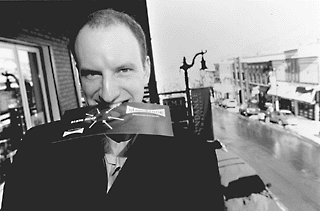
I'd been waiting, subconsciously I suppose, for pretty much this exact documentary to appear for quite a while. With the buzz on "independent film" turning from a murmur to a shout to a downright roar over the last few years, it's been a documentarian's dream project, and Zenovich's absorbing documentary manages to bring almost all of indie film world's top voices together in a series of talking-head interviews that are at once revelatory, humorous, and extremely inspirational. Everyone from Kevin Smith to Steven Soderbergh to John Pierson to Dan Mirvish is included in this glimpse of Sundance/Slamdance '96, and pretty much everything you'd ever want to know about the state of indie today is touched upon. But it's not just the "hows" and "whys" -- one more El Mariachi story is enough to drive anyone crazy -- it's also the "whos" and the "what the fucks." Tom DiCillo emerges as a Wildean cynic, Sundance Festival head Robert Redford manages to explain the event succinctly for once, and Austin's Steve Bilich carries his Ruta Wakening around in a Glad Bag. Irreverent, honest, and enlightening in the extreme, Independent's Day is reflexive indie filmmaking at its best. -- Marc Savlov
Next screening: 3/20, Dobie 2, 6:45pm
KITCHEN PARTY
Dir/scr: Gary Burns; Prod: Christine Haebler, John Hazlett; Assoc Prod: Karen Powell; Exec Prod: James Head, Scott Kennedy; DP: Robert Aschmann; Ed: Mark Lemmon, Reginald Harkema; Cast: Scott Speedman, Laura Harris, Gillian Barber, Kevin McNulty, Tygh Runyan, Sarah Strange.
35mm, 87 min., 1997 (RP)
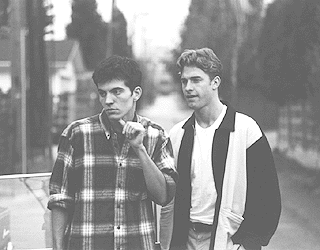
Canadian writer-director Gary Burns' sophomore film, Kitchen Party, is a deftly constructed study of how suburban banality, when stuck inside an insulated context, can elevate itself to drama. The film starts with the basic premise of parents so anal that they forbid their living room carpet (complete with a vacuuming pattern that would strike jealousy into the heart of Wrigley Field's groundskeeper) to be trod upon. From there, an afternoon of relatively harmless teen beer-drinking slowly, and with almost an After Hours flair for tension, unravels into a series of small-scale crises. But Burns, save for maybe one occasion, never allows things to go beyond the completely believable and never abandons the humorist aspects of modern middle-class dysfunctionality. Most impressively, though, he refrains from buying into the formulas that are there for the taking. Instead, Burns remains focused on the kids (whose biggest fears in life are their parents), and the parents (whose biggest anxieties are the result of those same kids). And the cast of teens do a textbook job of recreating and sustaining high school social awkwardness despite the impending truth that they are realizing their worst, albeit insignificant fears. -- Michael Bertin
Next screening: 3/21, Paramount, 9:30pm
THE LONG WAY HOME
Dir/scr: Mark Jonathan Harris; Prod: Rabbi Marvin Hier, Richard Trank; DP: Don Lenzer; Ed: Kate Amend; Narr: Morgan Freeman.
35mm, 120min., 1997 (RP)
This Oscar-nominated documentary about the struggle to establish the Jewish state of Israel following the Holocaust is a powerful work that's almost flawless in its execution. Using remarkable film footage, archival photography, and narration by Morgan Freeman, The Long Way Home relates how the survivors of Hitler's reign of terror defied all odds to return to the land of milk and honey, the homeland of Israel. The obstacles standing between them and their destination will appall those not familiar with this blemished chapter in world history: the Allies' inability to address effectively the issue of "displaced persons" freed from the concentration camps at war's end; British intransigence toward allowing greater immigration to the Holy Land; and of, course, rampant anti-Semitism in the highest of government ranks. Of course, The Long Way Home expresses one perspective on the question of Jewish claim to Israel -- it's produced by the Simon Wiesenthal Center -- that some may find oversimplifies the issue. Be that as it may, whatever your beliefs on the matter, it's hard to deny the exquisite telling of this extraordinary story. -- Steve Davis
Next screening: 3/19, Dobie 3, 1:30pm
LOU REED: ROCK AND ROLL HEART
Dir: Timothy Greenfield-Sanders; Prod: Timothy Greenfield-Sanders & Karen Bernstein; Exec Prod: Susan Lacy; Ed: Jed Parker.
16mm, 76 min., 1997 (RP)
Portrait photographer Timothy Greenfield-Sanders turns to film portraiture in this documentary study of Lou Reed -- musician, poet, iconoclast. Though the viewpoint is reverential, it's hard to deny the subject's worthiness of such lauded esteem. Working chronologically, the film follows Reed's career from his association during his college years with Delmore Schwartz; to his formation of the Velvet Underground with musicians John Cale, Sterling Morrison, and Maureen Tucker and the band's "sponsorship" by Andy Warhol; to his solo career that's gone through several permutations since its start in the early Seventies; to his recent artistic leaps into poetry readings and a theatrical collaboration with Robert Wilson. Along the way, approximately 30 interviewees provide commentary and insight into Reed's life, times, and lasting influence. Among those interviewed are VU bandmates Cale and Tucker; Warhol scenesters Mary Woronov, Holly Woodlawn, Joe Dallesandro, Billy Name, and Gerard Malanga; music critics John Rockwell, David Fricke, and Lisa Robinson; collaborators David Bowie and Bob Ezrin; inspired fans Jim Carroll, Thurston Moore, Suzanne Vega, Patti Smith, and Czech Republic president Vaclav Havel; and many, many more. Shot on video and transferred to 16mm, the images sometimes seem as though they're not being presented in their optimum format. And though the documentary alludes to Reed's legendary asshole-ism, his past history of substance abuse, and his bisexuality, these are all given scant attention as characteristics that might be essential to a deeper understanding of the artist. But Greenfield-Sanders' film nevertheless shines like the refrain of an old VU song: "I'll Be Your Mirror."
-- Marjorie Baumgarten
Next screening: 3/21, Alamo, 3:45pm
SANITY
Dir/scr/prod: Geneva Fowler; DP: Adam N. Joseph; Cast: Tonie Perensky, Kerry Beyer, Ben Pascoe, Mark Hanks, Michael Dalmon.
35mm, 75min., 1998 (WP)
Roxanne is a beautiful, intelligent, wine-swilling woman with a death wish and just enough cowardice to constantly prolong her temporal agony. Enter salvation (through the window) in the form of Louis and Robert, two amateur criminals in search of a television set. Freaked out by Roxanne's maniacal demand for death in return for all of her worldly electronics, Louis escapes, leaving his friend and their borrowed firearms behind. Having lost Louis and faced with Robert's frustrating reluctance to kill, Roxanne decides on a different tactic. Using various household tools of torture (candles and lemons among them), she attempts to annoy him into a murderous rage, but her considerable powers of provocation have altogether different results. Tonie Perensky is brilliant as the beleaguered suicidee. (No wonder the woman can't die, she possesses embers that simply can't be snuffed out.) Full of throaty repartee, dark corners, and gleaming, burnished light, Sanity is a little picture brimming with unexpected complexity. Austin filmmaker Geneva Fowler, with help from a local cast and crew, has created a smart, funny, stylish picture with a vintage noir flare. Velvety, full-bodied and easy to swallow, Sanity packs a fine, tannic acid wit and a rich, ironic finish. Indulge yourself. You won't regret it. -- Hollis Chacona
Next screening: 3/19, Dobie 2, Midnight
SIX-STRING SAMURAI
Dir: Lance Mungia; Scr: Lance Mungia & Jeffrey Falcon; Prod: Leanna Creel, Jeffrey Flacon, Lance Mungia, Michael Burns; DP: Kristian Bernier; Ed: James Frisa; Cast: Jeffrey Flacon, Justin McGuire.
35mm, 91 min., 1997 (RP)
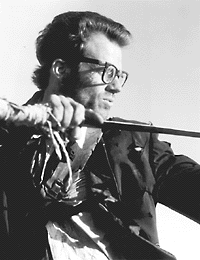 What do you get when you mix Akira Kurosawa with Elvis Presley, Tsui Hark with George Miller, and John Woo with the Three Stooges? Probably something like Mungia's feature debut, which also happens to be as pure an expression of the visual cinematic dynamic as I've seen in years. Set in a post-apocalyptic America (nuked by the Ruskies in 1957) where Elvis is King and Vegas is the capital, wandering ronin Buddy (as in Holly) travels the wasteland with his Bushido blade and hollowbody six-string guitar, seeking his destiny. Along the way, he hooks up with an orphaned little boy (think Lone Wolf and Cub) and fends off gangs of mutants, killers, and Death himself, who's very much into heavy metal. Hyper-adrenalized eye candy for the soul, Mungia's world is an all-encompassing vision, so original it hurts, and yet with so many goofy reference points that half the fun is playing "spot that homage." Cinematographer Kristian Bernier (also debuting) creates absolute magic on a predictably low budget; the film is crammed to bursting with jaw-droppingly spectacular shots that are as wacky as they are inspired. Wholly unique from start to finish, Six-String Samurai is a festival-goer's dream: You laugh, you cry, you stand up at the end and holler like crazy. More please. -- Marc Savlov
What do you get when you mix Akira Kurosawa with Elvis Presley, Tsui Hark with George Miller, and John Woo with the Three Stooges? Probably something like Mungia's feature debut, which also happens to be as pure an expression of the visual cinematic dynamic as I've seen in years. Set in a post-apocalyptic America (nuked by the Ruskies in 1957) where Elvis is King and Vegas is the capital, wandering ronin Buddy (as in Holly) travels the wasteland with his Bushido blade and hollowbody six-string guitar, seeking his destiny. Along the way, he hooks up with an orphaned little boy (think Lone Wolf and Cub) and fends off gangs of mutants, killers, and Death himself, who's very much into heavy metal. Hyper-adrenalized eye candy for the soul, Mungia's world is an all-encompassing vision, so original it hurts, and yet with so many goofy reference points that half the fun is playing "spot that homage." Cinematographer Kristian Bernier (also debuting) creates absolute magic on a predictably low budget; the film is crammed to bursting with jaw-droppingly spectacular shots that are as wacky as they are inspired. Wholly unique from start to finish, Six-String Samurai is a festival-goer's dream: You laugh, you cry, you stand up at the end and holler like crazy. More please. -- Marc Savlov
Next screening: 3/20, Alamo, 1pm






